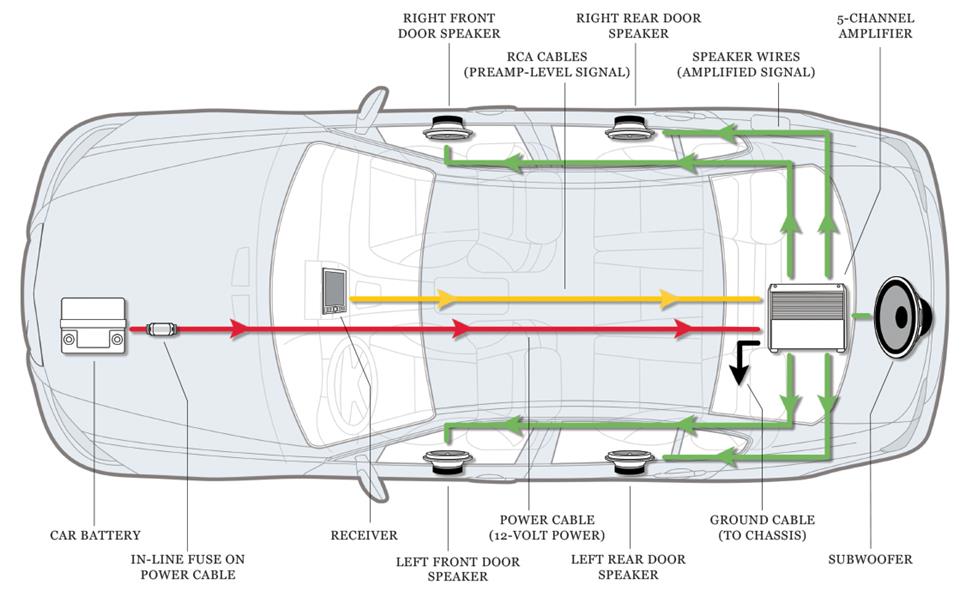Unlocking Deep Bass: The Subwoofer Amplifier Question
Want earth-shattering bass that truly immerses you in your music or movies? A subwoofer can deliver that powerful low-end rumble, but the question often arises: is a separate amplifier necessary? The answer, in most cases, is a resounding yes. Understanding the relationship between subwoofers and amplifiers is crucial for achieving the desired audio performance. This article delves into the why, when, and how of powering your subwoofer effectively.
Subwoofers are specialized speakers designed to reproduce the lowest frequencies in audio, the deep bass tones that add impact and realism. Unlike standard speakers, subwoofers typically require significant power to accurately reproduce these frequencies. While some audio systems, like soundbars or powered subwoofers, have built-in amplification, passive subwoofers necessitate an external amplifier. This dedicated power source ensures the subwoofer has enough juice to move the larger cone and produce the desired low-frequency output.
The need for a dedicated subwoofer amplifier stems from the physics of sound reproduction. Low-frequency sounds require more energy to produce than higher frequencies. Standard receivers or amplifiers often lack the necessary power reserve to drive a subwoofer effectively while simultaneously powering the other speakers in your system. A dedicated subwoofer amplifier provides the clean, consistent power required for optimal subwoofer performance, preventing distortion and ensuring accurate bass reproduction.
Historically, subwoofers and their associated amplifiers were primarily found in high-end audio setups or home theater systems. As technology progressed, subwoofers became more accessible and affordable, making them a popular addition to a wider range of audio setups. However, the fundamental principle of needing sufficient power for optimal performance remains unchanged. Without a dedicated amplifier, a passive subwoofer simply can't deliver the deep, resonant bass it's designed for.
Choosing the right subwoofer amplifier impacts several crucial aspects of your listening experience. An underpowered amplifier can lead to clipping and distortion, damaging your subwoofer and producing unpleasant audio. Conversely, an overpowered amplifier can also damage the subwoofer if the gain is set too high. Matching the amplifier's power output to the subwoofer's power handling capabilities is essential for achieving clean, powerful bass and prolonging the life of your equipment.
A key benefit of using a dedicated subwoofer amp is improved overall sound quality. By offloading the bass frequencies to the subwoofer amplifier, the main receiver or amplifier can focus on powering the other speakers more efficiently. This results in clearer midrange and high frequencies, creating a more balanced and dynamic soundscape.
Another advantage is greater control over the subwoofer's output. Dedicated subwoofer amplifiers often feature adjustable crossover frequencies, phase controls, and gain adjustments. These controls allow you to fine-tune the subwoofer's performance, integrating it seamlessly with your other speakers and tailoring the bass response to your specific listening environment and preferences.
Finally, a dedicated subwoofer amplifier can significantly enhance the impact and immersion of movies and music. The deep, powerful bass produced by a properly powered subwoofer adds a visceral dimension to action scenes, explosions, and musical passages, creating a more engaging and realistic listening experience.
Advantages and Disadvantages of Using a Dedicated Subwoofer Amplifier
| Advantages | Disadvantages |
|---|---|
| Improved sound quality | Added cost |
| Greater control over subwoofer output | Requires more space and setup |
| Enhanced bass impact and immersion | Potential for wiring complexity |
Frequently Asked Questions:
1. Do all subwoofers require an external amplifier? No, powered subwoofers have built-in amplification.
2. How do I choose the right amplifier for my subwoofer? Match the amplifier's power output to the subwoofer's power handling.
3. Can I use my receiver's amplifier to power my subwoofer? It depends on the receiver and subwoofer, but a dedicated amp is usually recommended.
4. What is a crossover frequency? It's the frequency point where the subwoofer takes over from the main speakers.
5. What are the signs of an underpowered subwoofer amplifier? Clipping, distortion, and lack of impactful bass.
6. How do I connect a subwoofer amplifier to my receiver? Use an RCA cable from the receiver's subwoofer output to the amplifier's input.
7. What is the purpose of a subwoofer phase control? It adjusts the timing of the subwoofer's output relative to the main speakers.
8. Can I damage my subwoofer with an overpowered amplifier? Yes, if the gain is set too high.
In conclusion, the question of whether you need an amplifier for your subwoofer depends on the type of subwoofer you have. While powered subwoofers have built-in amplification, passive subwoofers require an external amplifier to function correctly. A dedicated subwoofer amplifier offers significant benefits, including improved sound quality, greater control over bass output, and enhanced immersion in your audio experience. By understanding the role of amplification and choosing the right amplifier for your subwoofer, you can unlock the full potential of your audio system and enjoy deep, powerful bass that truly brings your music and movies to life. Investing in a quality subwoofer amplifier is a crucial step towards achieving the ultimate listening experience. So, take the time to research your options, consider your specific needs, and choose an amplifier that will maximize your subwoofer’s performance for years to come.
Mastering bowling adjustments your guide to higher scores
Decoding dog paw chewing why your pup nibbles and what to do
Taming the touchpad a gateway laptop guide














